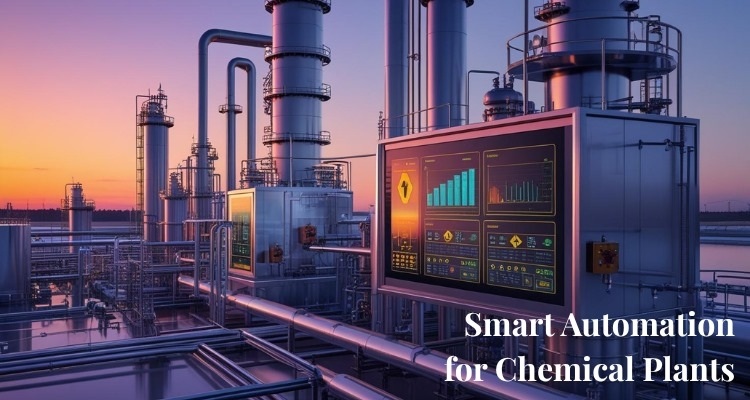The chemical industry plays a crucial role in powering the global economy, providing essential materials for countless industries. However, chemical plants face unique challenges—complex processes, hazardous environments, stringent safety regulations, and high operational costs. To remain competitive and compliant in today’s dynamic market, companies are turning to process automation as a strategic solution.
This blog dives into how automation technologies are transforming chemical plants, enhancing safety, and driving productivity like never before.
The Challenges of Chemical Plant Operations
Chemical manufacturing involves handling volatile substances, high-temperature reactions, and precise formulations. Key operational challenges include:
- Maintaining operator safety in hazardous zones.
- Complying with environmental and safety regulations.
- Reducing energy consumption and operational costs.
- Ensuring product quality and consistency across batches.
- Managing real-time data from multiple systems and equipment.
Addressing these challenges requires an intelligent, automated approach.
How Process Automation is Revolutionizing Chemical Plants
1️. Enhanced Safety Through Automation
Safety is the top priority in chemical processing. Automation solutions reduce human intervention in dangerous tasks:
- Automated Emergency Shutdown Systems (ESD): Instantly react to abnormal conditions, preventing accidents.
- Real-Time Monitoring: Sensors track critical parameters like temperature, pressure, and chemical concentrations.
- Remote Operations: Enable operators to manage plants from control rooms or off-site locations, reducing exposure risks.
2️. Boosting Productivity and Efficiency
Process automation ensures chemical plants operate at peak performance:
- Advanced Process Control (APC): Optimizes production by fine-tuning parameters for maximum output with minimal waste.
- Batch Automation: Standardizes processes, improving quality and reducing cycle times.
- Energy Optimization: Intelligent systems monitor energy usage and suggest ways to cut costs.
3️. Improved Compliance and Sustainability
Automation supports strict regulatory compliance:
- Emissions Monitoring: Real-time tracking of pollutants to meet environmental standards.
- Audit-Ready Data: Automatic logging of process data simplifies compliance reporting.
- Waste Reduction: Smart systems minimize byproducts and enhance resource utilization.
Benefits of Process Automation for Chemical Plants
- Safety First
Protects workers and assets with real-time hazard detection and response systems. - Consistent Quality
Maintains tight control over complex chemical reactions and formulations. - Reduced Operational Costs
Cuts energy consumption and material wastage. - Scalability and Flexibility
Quickly adapts to changing market demands and production requirements. - Regulatory Confidence
Ensures plants stay compliant with evolving global standards.
Moving Towards Smart Chemical Manufacturing
The integration of Industry 4.0 technologies—such as Industrial IoT (IIoT), Artificial Intelligence (AI), and digital twins—is pushing chemical plants toward becoming “smart factories.” These connected, intelligent plants are capable of self-diagnosis, predictive maintenance, and autonomous decision-making.
Automation is no longer just a tool for efficiency—it’s the backbone of future-ready chemical operations.
How Softcon Systems Leads in Chemical Plant Automation
At Softcon Systems, we bring cutting-edge process automation solutions tailored for the chemical industry. From greenfield projects to modernization of existing plants, our expertise ensures safer, smarter, and more productive operations.
Our services include:
- End-to-End Process Automation
- Integration of Advanced Control Systems
- Turnkey Automation Solutions for Chemical Plants
Is your chemical plant ready for the automation revolution?
Get in touch with us to explore innovative solutions for enhancing safety, productivity, and compliance.
Visit: www.softcon.net.in





